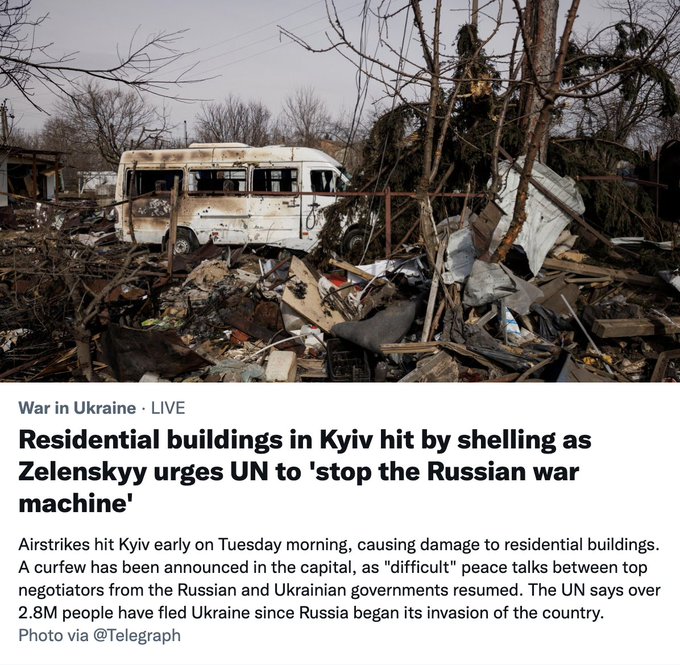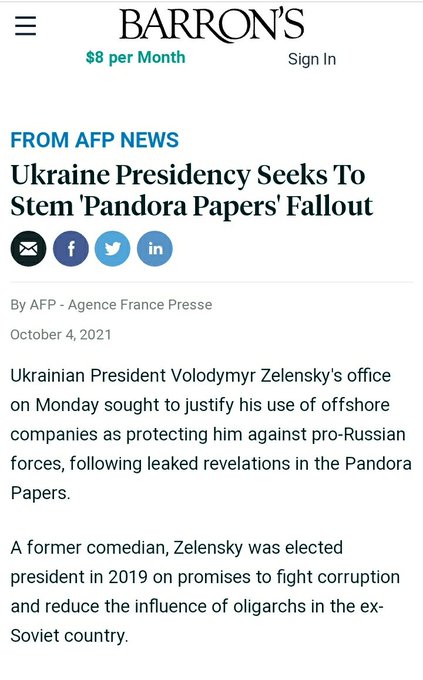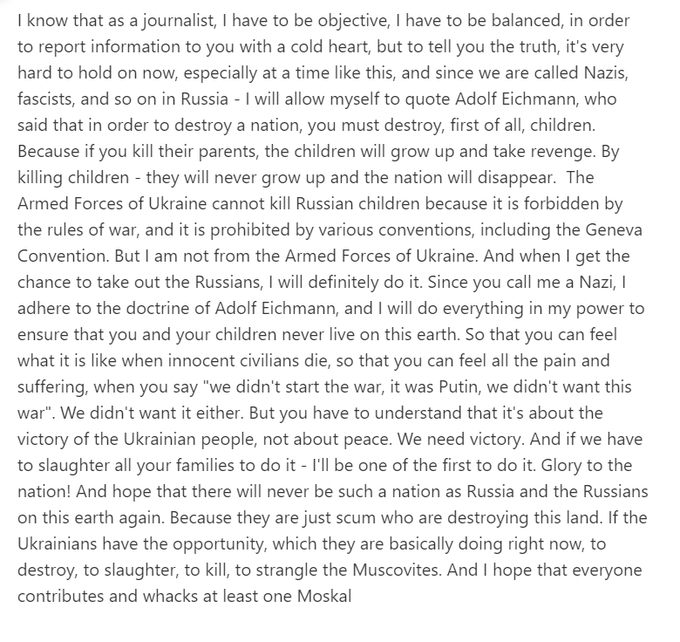Zenbait twitter
George Szamuely@GeorgeSzamuely
Russia is one of the biggest fuel & ammunition producers in the world. Why would it run out of fuel & ammunition? Russia is next door; so resupply shouldn’t be a problem, particularly as Ukraine has shown no capability to damage Russia’s supply lines.
oooooo
And the British govt could hardly let the Azov NeoNazi death squads go without NLAWs & trainers too, now could they?
oooooo
British NLAWs already in Right Sector NeoNazi death squads’ hands is a good look.
oooooo
I don’t know, what do modern day “dronies” make of West-backed Kiev Putsch regime forces not only flying the ubiquitous Right Sector/OUN Nazi collaborator flag & Azov Wolfsangel, but actual Nazi flags as they killed their own people for eight years? https://twitter.com/Jake_Hanrahan/status/1118528538636881920?t=rdEtHQ6nmhwTF3jsG6-nPg&s=19
Txioa aipatu
Stephen McDonell@StephenMcDonell
mar. 11
BTW I wonder what modern-day “tankies” make of #Russia’s tanks flying the Soviet flag as they invade #Ukraine? #UkraineRussiaWar
Erakutsi haria
oooooo
erabiltzaileari erantzuten
As Chomsky says, “NATO exists to deal with the problems created by its existence.”
oooooo
Poland bears considerable responsibility for the present crisis. Poland was supposed to be one of the guarantors of the Feb. 21, 2014, agreement between Viktor Yanukovych & the opposition. Instead, within 24 hours, Poland cheered on the opposition’s abandonment of the agreement.
Txioa aipatu
Andrzej Duda@AndrzejDuda
9 h
President Lech Kaczyński was right when he said in Tbilisi in 2008, that: “Central Europe has brave leaders.” . We need unity and strong support for Ukraine from the entire EU
. Poland is and will be the advocate of Ukraine!
https://reuters.com/world/europe/t
oooooo
This is from current CIA chief William J. Burns’s memoirs, “The Back Channel,” published in 2019. Nothing to do with NATO expansion, right.
oooooo
“Defensive alliance” NATO predated the creation of the Warsaw Pact by six years.
Txioa aipatu
Stephen Kinzer@stephenkinzer
6h
Sen. Robert Taft opposed creation of NATO: “The building up of a great army surrounding Russia…means inevitably an armament race, and armament races in the past have led to war...[NATO] will do far more to bring about a third world war than it ever will to maintain the peace.”
oooooo
Curious @Twitter
… Are the people of the Donbas somehow less human or less important than the people of Ukraine? Because over the last 8 years, I’ve never once seen you promoting images of their civilian casualties—including women and children— in “What’s Happening”.
oooooo
When Zelensky was connected by an anti-corruption investigation to a network of offshore companies, he blamed Russia lmao. Russia, he said, forced him to be corrupt. Obviously, this guy is the straight shooter the media has made him out to be.
oooooo
BREAKING: Ukrainian television broadcasts a segment advocating the extermination of all Russians, starting with Russian children. It quotes Nazi Adolf Eichmann, who carried out the holocaust: “in order to destroy a nation you must destroy, first of all, children.”
Txioa aipatu
Russians With Attitude@RWApodcast
2 h
fakhrudin sharafmal on ukrainian channel 24 quoting adolf eichmann & calling for the killing of russian children, translation in next tweet
Erakutsi haria
oooooo
The Ukrainian government has released a statement about the superior Slavic racial purity of its people compared to Russians. “Ukrainians originate from the Slavic tribes. The Russian nation was formed to a large extent through mixing…”
Txioa aipatu
Ukrainian Institute of National Remembrance@Uinp_gov_ua
mar. 14
Argument #9: Ukrainians and russians have different origin
Erakutsi haria
Erakutsi haria
ooooo
oooooo
George Szamuely@GeorgeSzamuely
If we do get through the Ukraine crisis without a war, what will NATO do? Will it behave in its usual numbskull way and begin to deploy short- and intermediate-range missiles in eastern Europe? If it does–and I fully expect it to do so–then war is inevitable within two years.
oooooo
George Szamuely@GeorgeSzamuely
What should terrify people is that this person held a very senior position in the Pentagon. Which means that there are more such ignorant, demented people at the highest levels of government.
oooooo
Russia can pay its debts. Fed, ECB, won’t process those payments. Who is the defaulter?
oooooo
Gogorati ondoko hau:
Neil Wilson-en The Unreasonable Ineffectiveness of Sanctions on Russia
28 Feb 2022
https://new-wayland.com/blog/the-unreasonable-ineffectiveness-of-sanctions-on-russia/
oooooo
Hold it! Biological weapons in Ukraine labs? Weren’t we just told that there were no biological weapons there, just innocuous research to counter horrid diseases.
Txioa aipatu
mar. 13
Putin could unleash biological weapon from seized Ukraine lab, experts fear https://mirror.co.uk/news/world-new
oooooo
Ukraine 24 presenter goes full Nazi, endorses Adolf Eichmann to call for genocide of Russians. “By killing children, they will never grow up and the nation will disappear… and I hope that everyone will contribute and kill at least one Muscovite.”
Bideoa: https://twitter.com/i/status/1503829062556520448
oooooo
erabiltzaileari erantzuten
Well you see, when they are funded by the US and kept in Ukrainian labs, they are “defensive research.” The moment they fall into the hands of Evil Russians, they become “lethal biological weapons.” Call it the Imperial Transubstantiation Doctrine, if you will.
Oooooo
erabiltzaileari erantzuten
Saying the same thing over and over doesn’t make it any more viable. NATO has two choices—remain neutral and live, or get involved and die. I don’t understand why you don’t get this.
oooooo
One of most important documents of 20th century— Der Spiegel uncovers archival document promising NATO non-expansion – Athens News

Der Spiegel uncovers archival document promising NATO non-expansion
https://en.rua.gr/2022/02/18/der-spiegel-uncovers-archival-document-promising-nato-non-expansion/
oooooo
John Mearsheimer on why the West is principally responsible for the Ukrainian crisis
The political scientist believes the reckless expansion of NATO provoked Russia
Mar 11th 2022
THE WAR in Ukraine is the most dangerous international conflict since the 1962 Cuban missile crisis. Understanding its root causes is essential if we are to prevent it from getting worse and, instead, to find a way to bring it to a close.
There is no question that Vladimir Putin started the war and is responsible for how it is being waged. But why he did so is another matter. The mainstream view in the West is that he is an irrational, out-of-touch aggressor bent on creating a greater Russia in the mould of the former Soviet Union. Thus, he alone bears full responsibility for the Ukraine crisis.
But that story is wrong. The West, and especially America, is principally responsible for the crisis which began in February 2014. It has now turned into a war that not only threatens to destroy Ukraine, but also has the potential to escalate into a nuclear war between Russia and NATO.
The trouble over Ukraine actually started at NATO’s Bucharest summit in April 2008, when George W. Bush’s administration pushed the alliance to announce that Ukraine and Georgia “will become members”. Russian leaders responded immediately with outrage, characterising this decision as an existential threat to Russia and vowing to thwart it. According to a respected Russian journalist, Mr Putin “flew into a rage” and warned that “if Ukraine joins NATO, it will do so without Crimea and the eastern regions. It will simply fall apart.” America ignored Moscow’s red line, however, and pushed forward to make Ukraine a Western bulwark on Russia’s border. That strategy included two other elements: bringing Ukraine closer to the EU and making it a pro-American democracy.
These efforts eventually sparked hostilities in February 2014, after an uprising (which was supported by America) caused Ukraine’s pro-Russian president, Viktor Yanukovych, to flee the country. In response, Russia took Crimea from Ukraine and helped fuel a civil war that broke out in the Donbas region of eastern Ukraine.
The next major confrontation came in December 2021 and led directly to the current war. The main cause was that Ukraine was becoming a de facto member of NATO. The process started in December 2017, when the Trump administration decided to sell Kyiv “defensive weapons”. What counts as “defensive” is hardly clear-cut, however, and these weapons certainly looked offensive to Moscow and its allies in the Donbas region. Other NATO countries got in on the act, shipping weapons to Ukraine, training its armed forces and allowing it to participate in joint air and naval exercises. In July 2021, Ukraine and America co-hosted a major naval exercise in the Black Sea region involving navies from 32 countries. Operation Sea Breeze almost provoked Russia to fire at a British naval destroyer that deliberately entered what Russia considers its territorial waters.
The links between Ukraine and America continued growing under the Biden administration. This commitment is reflected throughout an important document—the “US-Ukraine Charter on Strategic Partnership”—that was signed in November by Antony Blinken, America’s secretary of state, and Dmytro Kuleba, his Ukrainian counterpart. The aim was to “underscore … a commitment to Ukraine’s implementation of the deep and comprehensive reforms necessary for full integration into European and Euro-Atlantic institutions.” The document explicitly builds on “the commitments made to strengthen the Ukraine-U.S. strategic partnership by Presidents Zelensky and Biden,” and also emphasises that the two countries will be guided by the “2008 Bucharest Summit Declaration.”
Unsurprisingly, Moscow found this evolving situation intolerable and began mobilising its army on Ukraine’s border last spring to signal its resolve to Washington. But it had no effect, as the Biden administration continued to move closer to Ukraine. This led Russia to precipitate a full-blown diplomatic stand-off in December. As Sergey Lavrov, Russia’s foreign minister, put it: “We reached our boiling point.” Russia demanded a written guarantee that Ukraine would never become a part of NATO and that the alliance remove the military assets it had deployed in eastern Europe since 1997. The subsequent negotiations failed, as Mr Blinken made clear: “There is no change. There will be no change.” A month later Mr Putin launched an invasion of Ukraine to eliminate the threat he saw from NATO.
This interpretation of events is at odds with the prevailing mantra in the West, which portrays NATO expansion as irrelevant to the Ukraine crisis, blaming instead Mr Putin’s expansionist goals. According to a recent NATO document sent to Russian leaders, “NATO is a defensive Alliance and poses no threat to Russia.” The available evidence contradicts these claims. For starters, the issue at hand is not what Western leaders say NATO’s purpose or intentions are; it is how Moscow sees NATO’s actions.
Mr Putin surely knows that the costs of conquering and occupying large amounts of territory in eastern Europe would be prohibitive for Russia. As he once put it, “Whoever does not miss the Soviet Union has no heart. Whoever wants it back has no brain.” His beliefs about the tight bonds between Russia and Ukraine notwithstanding, trying to take back all of Ukraine would be like trying to swallow a porcupine. Furthermore, Russian policymakers—including Mr Putin—have said hardly anything about conquering new territory to recreate the Soviet Union or build a greater Russia. Rather, since the 2008 Bucharest summit Russian leaders have repeatedly said that they view Ukraine joining NATO as an existential threat that must be prevented. As Mr Lavrov noted in January, “the key to everything is the guarantee that NATO will not expand eastward.”
Tellingly, Western leaders rarely described Russia as a military threat to Europe before 2014. As America’s former ambassador to Moscow Michael McFaul notes, Mr Putin’s seizure of Crimea was not planned for long; it was an impulsive move in response to the coup that overthrew Ukraine’s pro-Russian leader. In fact, until then, NATO expansion was aimed at turning all of Europe into a giant zone of peace, not containing a dangerous Russia. Once the crisis started, however, American and European policymakers could not admit they had provoked it by trying to integrate Ukraine into the West. They declared the real source of the problem was Russia’s revanchism and its desire to dominate if not conquer Ukraine.
My story about the conflict’s causes should not be controversial, given that many prominent American foreign-policy experts have warned against NATO expansion since the late 1990s. America’s secretary of defence at the time of the Bucharest summit, Robert Gates, recognised that “trying to bring Georgia and Ukraine into NATO was truly overreaching”. Indeed, at that summit, both the German chancellor, Angela Merkel, and the French president, Nicolas Sarkozy, were opposed to moving forward on NATO membership for Ukraine because they feared it would infuriate Russia.
The upshot of my interpretation is that we are in an extremely dangerous situation, and Western policy is exacerbating these risks. For Russia’s leaders, what happens in Ukraine has little to do with their imperial ambitions being thwarted; it is about dealing with what they regard as a direct threat to Russia’s future. Mr Putin may have misjudged Russia’s military capabilities, the effectiveness of the Ukrainian resistance and the scope and speed of the Western response, but one should never underestimate how ruthless great powers can be when they believe they are in dire straits. America and its allies, however, are doubling down, hoping to inflict a humiliating defeat on Mr Putin and to maybe even trigger his removal. They are increasing aid to Ukraine while using economic sanctions to inflict massive punishment on Russia, a step that Putin now sees as “akin to a declaration of war”.
America and its allies may be able to prevent a Russian victory in Ukraine, but the country will be gravely damaged, if not dismembered. Moreover, there is a serious threat of escalation beyond Ukraine, not to mention the danger of nuclear war. If the West not only thwarts Moscow on Ukraine’s battlefields, but also does serious, lasting damage to Russia’s economy, it is in effect pushing a great power to the brink. Mr Putin might then turn to nuclear weapons.
At this point it is impossible to know the terms on which this conflict will be settled. But, if we do not understand its deep cause, we will be unable to end it before Ukraine is wrecked and NATO ends up in a war with Russia. ■7
John J. Mearsheimer is the R. Wendell Harrison Distinguished Service Professor of Political Science at the University of Chicago.







